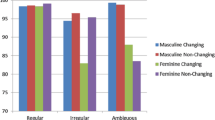Abstract
We investigated the person and number agreement performance of threeagrammatic aphasics in sentences and possessive nominal phrases. In the tasksthe patients had to supply 108 incomplete possessed nominal phrases and 108incomplete verbs with the right in ectional markers. Generally, the numberor person agreement feature was checked in the answers, resulting in agreementerrors. This finding suggests the diversity of the person and the number featurechecking in the course of syntactic derivation. On the basis of substitutionerrors we will argue that in agrammatism the selection of the replacing suxesis in uenced by two factors. One of them is syntactic and the other is a nonlinguisticone.
Similar content being viewed by others
References
Bánréti, Zoltán. 2000. Egyeztetés agrammatikus afáziában: A szintaktikai fa metszése [Agreement in agrammatic aphasia: Pruning the syntactic tree]. Ms., Research Institute of Linguistics, Hungarian Academy of Sciences.
Bartos, Huba. 1997. On “subjective” and “objective” agreement in Hungarian. In: Acta Linguistica Hungarica 44: 363-84.
Bartos Huba. 1999. Morfoszintaxis és interpretáció: A magyar inflexiós jelenségek szintaktikai háttere [Morphosyntax and interpretation: The syntactic aspects of Hungarian inflectional phenomena]. Doctoral dissertation, Eötvös Loránd University, Budapest.
Chomsky, Noam. 1995. The Minimalist Program. The MIT Press, Cambridge MA.
Corbett, Greville G.-Norman M. Frazer. 1993. Network morphology: A DART account of Russian nominal inflection. In: Journal of Linguistics 29: 113-42.
Dikken, Marcel den. 1999. On the structural representation of possession and agreement. The case of (anti-)agreement in Hungarian possessed nominal phrases. In: István Kenesei (ed.): Crossing Boundaries. 137-178. John Benjamins, Amsterdam.
É. Kiss, Katalin. 1987. Configurationality in Hungarian. Reidel, Dordrecht.
É. Kiss, Katalin. 1994. Sentence structure and word order. In: Kiefer-É. Kiss (1994): 1-90.
Friedmann, Na'ama-Yosef Grodzinsky. 1997. Tense and agreement in agrammatic production: Pruning the syntactic tree. In: Brain and Language 56: 394-425.
Füredi, Mihály-József Kelemen. 1989. A mai magyar nyelv szépprózai gyakorisági szótára (1965–1977) [The frequency dictionary of modern Hungarian fiction (1965–1977)]. Akadémiai Kiadó, Budapest.
Hagiwara, Hiroko. 1995. The breakdown of functional categories and the economy of derivation. In: Brain and Language 50: 92-116.
Kálmán, László. 1985a. Word order in neutral sentences. In: Kenesei (1985): 13-23.
Kálmán, László. 1985b. Word order in non-neutral sentences. In: Kenesei (1985): 25-38.
Kean, Marie Louise. 1977. The linguistic interpretation of aphasia syndromes: Agrammatism in Broca's aphasia, an example. In: Cognition 5: 9-46.
Kenesei, István (ed.) 1985. Approaches to Hungarian 1: Data and descriptions. JATE, Szeged.
Kiefer, Ferenc-Katalin É. Kiss (eds). 1994. Syntax and semantics 27: The syntactic structure of Hungarian. Academic Press, New York.
Kolk, Hermann H. J. 1995. A time-based approach to agrammatic production. In: Brain and Language 50: 282-303.
Lonzi, Lidia-Claudio Luzatti. 1993. Relevance of adverb distribution for the analysis of sentence representation in agrammatic patients. In: Brain and Language 45: 306-17.
Osmán-Sági, Judit. 1991. Diagnosis and classification of aphasia. In: Ideggyógyászati Szemle 44: 339-62.
Szabolcsi, Anna. 1994. The Noun Phrase. In: Kiefer-É. Kiss (1994): 179-274.
Author information
Authors and Affiliations
Rights and permissions
About this article
Cite this article
Mészáros, É. Person and number agreement in agrammatism. Acta Linguistica Hungarica 48, 217–242 (2001). https://doi.org/10.1023/A:1015651607142
Issue Date:
DOI: https://doi.org/10.1023/A:1015651607142




